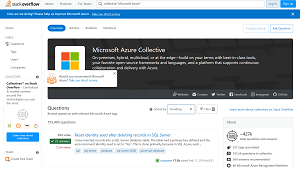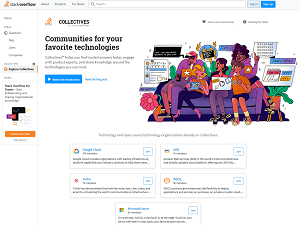News
Microsoft Launches 'One-Stop-Shop' for Stack Overflow Questions on Azure Development
Anybody who has ever seriously coded has visited Stack Overflow's development-oriented Q&A site numerous times, probably hundreds or thousands of times. It's the go-to resource for developers seeking answers to mind-wracking problems for which published documentation offers no solutions, as someone in the SO community has likely run into the same thing and is willing to share their knowledge.
That's why Microsoft just invited cloud devs to "Join the Azure Collective on Stack Overflow," described as "your one-stop shop on Stack Overflow for all things Azure."
Microsoft Azure Collective members will get easier access to more than 190,000 questions and other relevant content using over 350 tags, the company said in a Feb. 21 announcement. In curating Azure tags including azure-functions, azure-storage azure-active-directory, azure-sql-database and azure-cosmosdb and more, the collective highlights recommended answers to members' questions. That, Microsoft said, ensures that correct answers to a specific question can be promoted regardless of how many upvotes they received.
 [Click on image for larger view.] Microsoft Azure Collective (source: SO).
[Click on image for larger view.] Microsoft Azure Collective (source: SO).
"The developer community is central to developer productivity," said Microsoft's Courtney Bowler in the launch announcement. "We've seen developers ask and answer questions and share content to contribute to each other's success, helping us all to achieve more.
"We appreciate that the developer community is getting value out of Stack Overflow and the content that has already been created by hundreds of thousands of developers. We share in your enthusiasm for the platform and want to explore a new way to help build the community experience there."
She said benefits of joining the collective -- open to any developer with an SO account -- include the ability to:
- Quickly find trusted answers recommended by Recognized Members of the Azure community.
- Engage with new content formats and get in-depth product knowledge that's only on the Collective like Articles and Bulletins directly from Azure.
- Build your Collective reputation when you ask or answer questions and see your contributions appear on the member leaderboard. If your contributions continually help other users, we can invite you to become a Recognized Member. Recognized Members are acknowledged on their Stack Overflow profile and include a few extra privileges within the Collective, such as the ability to recommend answers.
- Become part of our Azure developer community, empowering developers to work better together.
 [Click on image for larger view.] SO Collectives (source: SO).
[Click on image for larger view.] SO Collectives (source: SO).
SO collectives aren't a new thing, being announced in June 2021 with Google Cloud and Google's Go programming language as the initial offerings. So the Azure effort (about 3,000 members) has company from competitors like Google Cloud (37,000 members) and AWS (7,000 members). And even though Microsoft's post to "announce we've launched" was just published this week, the Microsoft Azure Collective isn't new, either, having been created in October 2022, according to its description, about a month earlier than the AWS collective.
About the Author
David Ramel is an editor and writer at Converge 360.